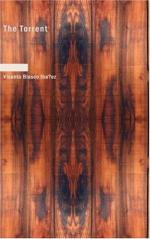Rafael shook his head. The mention of his father had touched him, and he was convinced by the old man’s arguments; but none the less he was determined to resist. No, and again no; his die was cast: he would continue on his way.
They were now under the trees of the Alameda. The carriages were rolling by, forming an immense wheel in the center of the avenue. The harnesses of the horses and the lamps of the drivers’ boxes gleamed in the sunlight. Women’s hats and the white lace shawls of children could be seen through the coach windows as they passed.
Don Andres became impatient with the youth’s stubbornness. He pointed to all those happy, peaceful-looking families out for their afternoon drive—wealth, comfort, public esteem, abundance, freedom from struggle and toil! Cristo, boy! Was that so bad, after all? Well, that was just the life he could have if he would be good and not turn his back on his plain duty—rich, influential, respected, growing old with a circle of nice children about him. What more could a decent person ask for in this world?
All that bohemian nonsense about pure love, love free from law and restraint, love that scoffs at society and its customs, sufficient unto itself and despising public opinion, that was just bosh, the humbug of poets, musicians and dancers—a set of outcasts like that woman who was taking him away, cutting him off forever from all the ties that bound him to family and country!
The old man seemed to take courage from Rafael’s silence. He judged the moment opportune for launching the final attack upon the boy’s infatuation.




